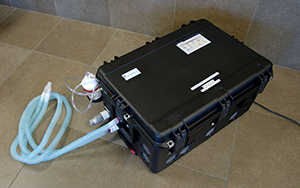
Nov. 10, 2020
L3Harris, which produces a wide range of aviation/aerospace products in various commercial and military sectors, recently had its engineers show off their innovation talents as part of the Department of Defense’s Hack-A-Vent Innovation Challenge to design a low-cost, ventilator system to help patients combatting COVID-19.
Out of 172 submissions, L3Harris’ entry, the Innovative Inspiratory Ideas (i3) Breather prototype, was one of five designs chosen that is currently going through government testing in order to receive emergency use certification from the Food and Drug Administration.
This is just one of the many ways companies in the business aviation sector are assisting during the COVID-19 pandemic,
“The ventilator project being conducted by L3Harris is worthy to highlight because an NBAA member has refocused an aviation engineering team to the design of a critical medical instrument in a national emergency,” said Steve Hadley, NBAA regional program senior director, and Southwestern Central regional representative. “Their innovative approach to the emergency will bring benefits, not only to the country as a whole but to the business aviation industry as we learn from confronting this challenge how to streamline and focus our workforce to be more effective in the work that we do.”
“The L3Harris team developed the i3 Breather after a five-day design process modified for social distancing and remote participation,” said Jon Piatt, L3Harris Integrated Aerospace Systems vice president and general manager. “The initial prototype design team was comprised of 39 individuals from aerospace, university research, and health care industries, and included 31 L3Harris employees from across the flight sciences, systems, electrical, mechanical, and software engineering disciplines. Of those 31 employees, 21 of them are aerospace engineers.”
Piatt noted that work on the ventilator project did not take designers away from their usual work assignments.
“The team gave up off-duty and family time during the emerging peak period of COVID-19, so the sacrifice was very personal to these individuals. In addition to their volunteer work on this project, many of the employees still had their daily work-related tasks to fulfill,” he said.
